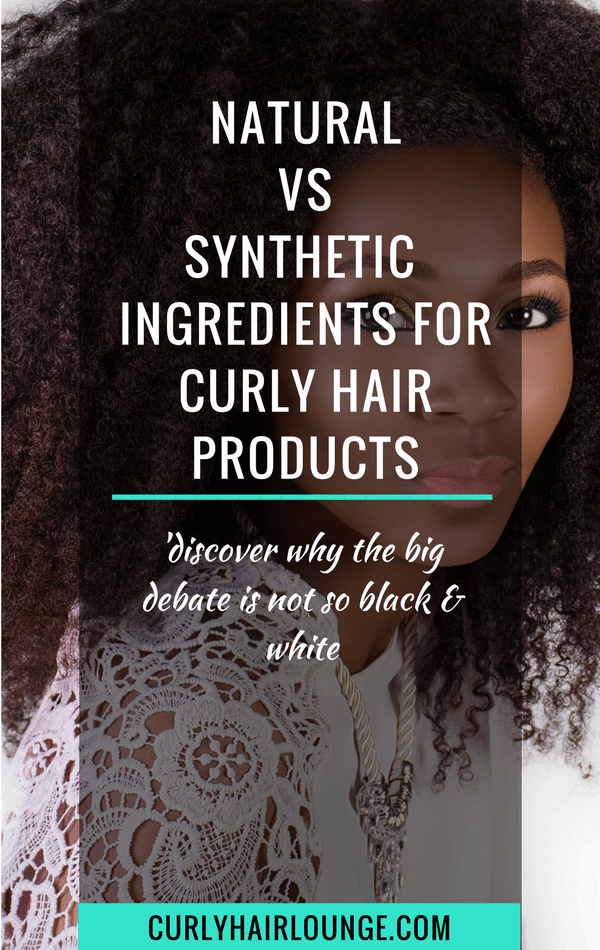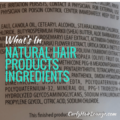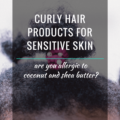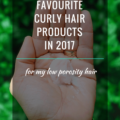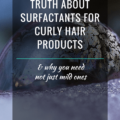I’ve been on my natural hair journey for 3 years now and, as many times stated on this blog, I favour natural ingredients over synthetic ones. However, over the course of my journey, I have come to realise that the debate over the use natural or synthetic ingredients for curly hair in the beauty industry is not as black and white as we may think it to be, in fact, it’s a very grey area.
I believe there is a lot of misinformation on the internet as people take their stance and ferociously defend their arguments perhaps without much thought or research. I may be known for being cautious and never taking things at face value, I like to do my own thing. Maybe that’s why research was one of the main components of my degree, it’s in my backbone.
Do I love picking up a product and seeing only natural ingredients? Sure, I delight in it. But, while we all like saying “I only use natural hair products/ingredients”, we also have to be aware that most of these products contain some form of a synthetic ingredient. So what exactly is a natural and a synthetic ingredient?
NATURAL vs SYNTHETIC INGREDIENTS
A natural ingredient is normally understood as a raw material from a plant, mineral or animal source, a substance that naturally occurs in nature and is not tainted with synthetic materials. A synthetic ingredient, on the other hand, is recognised as a chemical substance that doesn’t follow a natural process found in nature, it is the result of something that is made by men in a lab through chemical reactions. This is how we loosely understand these terms and this sounds reasonably accurate, right?!
So what about the other ingredients we often see on product labels?
Yeah, you know… the ones that have their plant name in parenthesis with the word “from”, “derived” or even “based”. What do you make of these ones? Well, these are naturally derived ingredients, in other words, they are natural ingredients that require or suffer some form of human intervention.
The difference between naturally derived and synthetic ingredients is that the latter doesn’t use any natural material from nature, but both require human skills. So are naturally derived ingredients closer to “natural” or “synthetic” ingredients?
Take, for instance, a raw material that is taken from nature, such as wheat or corn, and is then milled into flour. Can it be considered artificial/synthetic? What about wine? Although it can occur naturally in nature without human intervention, I guess we can all agree that human interference here yields in better wine quality.
When it comes to actual ingredients in hair products, what does Cocamidopropyl Betaine sound to you? Would you be surprised to hear that it derives from coconut? The lauric acid in coconut is used in a chemical process that gives us this naturally derived ingredient. So would you consider this ingredient more acceptable than a lab made one?
I guess it all depends on whether this naturally derived ingredient is not the result of a chemical reaction that drastically changed the original structure of the raw ingredient, but I guess this is information the consumer will hardly have access to and, once again, as you can see things are not so black and white.
DOES SYNTHETIC MEAN TOXIC?
The current concern for health and people’s easy access to information doesn’t always mean they are making the right choices, especially when there’s so much misinformation out there. Generally, people tend to equate something synthetic with something that causes allergies or has some toxic element to it, and the major concern here is avoiding carcinogenic ingredients. Yes, please, let’s do that!
Yes, studies have found ingredients whose use is correlated with harmful effects in men. However, this is not to say that all, or most, synthetic or naturally derived ingredients are bad. Take titanium dioxide, for instance, a natural sun protector that is found in nature but can’t be used in its pure form because it may be contaminated with harmful heavy metals (lead and iron). Thus, it goes under a synthetic process to be purified and used by us. In this case, a natural ingredient is not better, it is actually harmful to us.
Take Propylene Glycol. It is a suspiciously-named ingredient that screams synthetic all over, doesn’t it? Well, it’s actually obtained from petroleum. As you know petroleum or crude oil, is the result of fossilised animals and plants and it is, by all means, a natural ingredient. And, although we don’t like petroleum-derived ingredients because they’re drying to curly hair, propylene glycol is different. This is a man-modified ingredient that can act as a humectant and is water soluble, contrary to mineral oil. So, this man-made naturally derived ingredient isn’t all that bad, is it?
Even fully synthetic ingredients are not the “evil”. Taking this choice can also mean natural resources are being spared and products can be sold at a more affordable price. But, I also have to say that manufacturing some of these chemical ingredients creates a problem for the environment, their production can create waste and pollute water banks.
The key here is to find a balance and take each ingredient case by case, especially because new studies are being made that support or disprove various arguments. My personal opinion is that natural or naturally derived ingredients are always better because your body will accept and respond to them much better than synthetic ones.
Take for instance vitamin E in supplements, they can be fully natural (d-alpha tocopherol, d-alpha tocopheryl acetate, or d-alpha tocopheryl succinate) or fully synthetic (dl-alpha-tocopherol or any variation starting with dl-) but the latter is not as efficient and well absorbed by our bodies as the former. Still, they both work…
So, how do you make your decision when reading product labels?
HOW TO MAKE A DECISION
This can be hard even for the most experienced person in reading labels. Why? Because natural ingredients can many times come labelled with their botanical or scientific name, which can sound a little “synthetic-y”. On the other hand, some creative labelling can make a synthetic ingredient look attractive.
Take these examples of natural ingredients:
- Lonicera Caprifolium (Honeysuckle) Flower
- Triticum Vulgare (Wheat) Germ Oil
- Zingiber Officinale (Ginger) Root Extract
- Sodium Chloride (Sea Salt)
- Beta Vulgaris (Beet) Root
- Theobroma Cacao (Cocoa) Seed Butter
As you can see, natural ingredients can come from flowers, minerals, plant parts (i.e. seeds, bark, leaf, root) or extracts (ie. oils or juice) and even fruits. What you need to look for is the name in the parenthesis, this will make the ingredients quickly recognisable as they’re part of your common vocabulary. Other times, the words “root extract” or “seed oil” will give you a hint.
As mentioned before in this article, naturally derived ingredients will have next to it a parenthesis mentioning its source with terms like terms “derived”, “from” or “based”. Take a look:
- Cocamidopropyl Betaine (Coconut-based)
- Sodium Lauryl Sulfonate (Plant-based)
- Tocopheryl Acetate (Vitamin E)
- Decyl Glucoside (Coconut Oil Derived)
As for synthetic ingredients, not derived from nature, there are many being used in the hair care industry and much more are probably still being developed as necessity arises. It is impossible to name them all, but here are a few examples:
- Methylisothiazolinone
- Polyquaternium-59
- Sodium Xylenesulfonate
- Phthalates
Finally, I would like to say that even with all the tips and tricks in reading hair or beauty product labels you can still be making a choice you don’t want to. Why? Because, although regulations in the European Union are tighter than in the US, different countries (and even entities) have different definitions of what a natural and synthetic ingredient is. Companies can still trick buyers by omitting an ingredient, doing some smart labelling or altering ingredients’ concentration in the formula when printing the label (position of the ingredient in the ingredients’ list). Stranger things have happened…
Always look to buy from reputable brands, that have a high ethical approach to what they do, respect the environment, their consumers and strive to improve and excel in these areas.
As you can see, deciding on natural or synthetic ingredients is not a one or the other type of choice. There are a few nuances to consider and, if I’m allowed to use a little analogy here, the weather is always foggy rather than sunny. Some people don’t take much thought about this matter and choose whatever their hair likes, some try to find a balance and others are on the other far end, only choosing what is natural.
My rule is, the more natural ingredients at the top of the ingredients’ list are the better (I rejoice in this) because they are the active ingredients, then let the naturally derived ingredients come and if I see a synthetic ingredient or one I don’t know, I do some profiling and decide upon that. This is why buying from online shops can sometimes be better, you can compare more ingredients, products, reviews and/or prices and make a better choice.
If you’re transitioning, I know this can all sound like a little too much, but knowing your ingredients is important and impacts on your hair’s health as many have characteristics you need to know about (film forming, for instance) in order to use them in an effective way (i.e. silicone). But don’t worry, this knowledge comes with time, experience and the determination to have healthy hair most of all.
What ingredients do you prefer and why?

